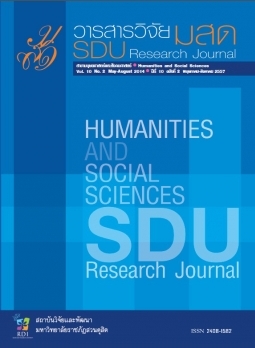Effects of The EIMA Learning Management on Scientific Explanation Ability, Reasoning and Thinking Ability and Science Learning Achievement of Grade 9 Students
Keywords:
EIMA Learning Management, Scientific Explanation Ability, Reasoning and Thinking Ability, Science Learning Achievement, TeamworkAbstract
The purposes of this research were to compare scientific explanation ability,
reasoning thinking, and scientific achievement before, after and the follow-up
periods in atoms and the periodic table of Grade 9 students ability using the EIMA
instruction model. In addition, qualitative data, teamwork ability were observed each
period. The study groups were Grade 9 students who were studying basic science
during the first semester of the 2017 academic year. They were from Triamudomsuksa
Suwinthawong School in Bangkok. One classroom was selected by Two-Stage
sampling. The implementation time was ten periods of fifty minutes. This research
was a quasi-experimental study. The research instruments included the EIMA
instruction model, lesson plans about atoms and knowledge of the periodic table in
scientific explanation making test, ability of reasoning and thinking test, a science
achievement test and teamwork observation form. The data were analyzed using
Mutivariate Analysis of Variance (MANOVA, with repeated measures). Moreover,
content analysis was used for qualitative data.
The research findings were as follows 1) Students who received EIMA
instruction had the ability to make scientific explanations, ability in reasoning
thinking and scientific achievement regarding atoms and the periodic table as shown
in the post-test and follow-up were higher than the pre-test at a .05 level of
significance. 2) From teamwork observation, students with EIMA students clearly
perceiving the importance of planning and the division of duties in a group. The
students volunteered to work on the strength in order to help the group and had more
awareness to help each other. The students cooperated to solve problems by asking
different questions, and to find answers from books, and through the network and
the ability to have evidence to support their answers.
References
the argument-driven inquiry instructional model on
ability in scientific explanation making and rationality
of upper secondary school students (Master’s thesis).
Bankkok: Chulalongkorn University.
Ates, S.; & Cataloglu, E. (2007). The Effects of Students’
Reasoning Abilities on Conceptual. Boston: McGraw-
Hill.
Berland, L. K. & Reiser, B. J. (2009). Making sense of
argumentation and explanation. Science Education, 93,
26-55.
Buason, R. (2013). The area of assessment. Edition 3rd. Sawan
Edition: Rim Ping Printing.
Juykrayang, S. (2010). Effects of using EIMA instruction model
on concepts of atmosphere and ability in explanation
making of lower secondary school students (Master’s
thesis). Bankkok: Chulalongkorn University.
McNeill, K. L. & Krajcik, J. S. (2007). Science explanation:
Characterizing and evaluating the effects of teachers’
instructional practices on student learning. Research
In Science Teaching, 45,53-78.
Schwarz & Gwekwerere. (2007). Using a guided inquiry and
modeling instructional framework (EIMA) to support
preservice K-8 science teaching. Science Education,
19,158-187.
Siriphet, P. (2017). The outcomes of learning with the future
problem solving process towards the global awareness
of the junior high school gifted and talented students.
SDU Research Journal Humanities and Social Sciences,
13(3), 145-164.
The Ministry of Education Thailand. (2008). The basic education
core curriculum B.E. 2551. Bangkok: Kurusapa Ladprao
Publishing.
The Institute for the Promotion of Teaching Science and
Technology (IPST). (2009). PISA 2009 mathematics
reading and science assessment results. Bangkok: The
Ministry of Education.
The Institute for the Promotion of Teaching Science and
Technology (IPST). (2012). PISA 2012 mathematics
reading and science assessment results. Bangkok: The
Ministry of Education.








